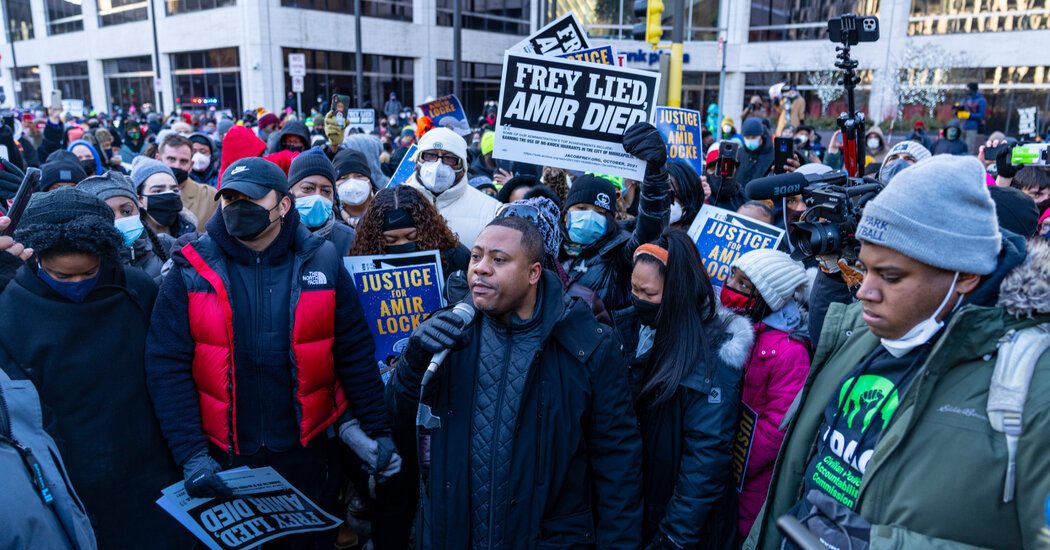Demonstrators march downtown days after the fatal shooting of Amir Locke, 22.
MINNEAPOLIS — Chanting the name of Amir Locke, a large crowd of protesters marched in frigid weather in downtown Minneapolis on Saturday to voice exasperation and anger over the conduct of law enforcement officers, nearly two years after the murder of George Floyd.
Mr. Locke, 22, was fatally shot in an early morning raid on Wednesday when a SWAT team for the Minneapolis Police Department carried out a search warrant for the police in nearby St. Paul involving a homicide.
Mr. Locke was not named as a suspect in the warrant, according to authorities.
Tensions over racial justice and police violence were already elevated in the Twin Cities before the death of Mr. Locke, who was Black. The federal trial against the three former Minneapolis police officers who stood by as Derek Chauvin, their superior officer, knelt on Mr. Floyd’s neck has been underway since Jan. 24.
A graphic and brief body camera video of the raid involving Mr. Locke released by the Minneapolis Police Department on Thursday night shows an officer quietly turning a key in the apartment door before officers enter the apartment and begin to shout.
“Police! Search warrant!” they yell.
One officer kicked the back of the couch, where Mr. Locke was huddled under a blanket, jarring Mr. Locke and making a gun visible. The police fired at least three times in response.
Mr. Locke died of multiple gunshot wounds, according to a report from the Hennepin County Medical Examiner.
Jeanelle Austin attended the protest draped in a white comforter not unlike the blanket Mr. Locke had over him when he was killed.
“I don’t know what today will bring,” she said. “But we need something different. We can’t keep continuing with more of the same. We’re dying.”
The killing of Mr. Locke has also increased scrutiny of the use of so-called no-knock warrants and cast doubts on the effectiveness of the efforts in Minneapolis to restrict the use of those surprise searches.
No-knock warrants allow the police to enter property without first announcing their presence and are primarily used when there is concern that evidence will be destroyed or officers will be put in danger.
The Police Department had obtained both knock and no-knock warrants for searches at three units in the apartment complex so that officers could decide which was appropriate in the moment, Amelia Huffman, the interim police chief in Minneapolis, said at a news conference on Thursday.
Nor was Mr. Locke a resident of the apartment, according to Jeff Storms, a lawyer representing Mr. Locke’s family, who said that Mr. Locke was staying there with a cousin.
In the wake of national outcry over the murder of Mr. Floyd by a Minneapolis police officer, Mayor Jacob Frey issued a new policy in 2020 requiring officers executing no-knock warrants to announce their presence and purpose before they enter except for extreme circumstances. Before the policy, the department executed 139 no-knock warrants per year, according to the mayor’s office.
This year, the number of no-knock warrants is already on track to reach about the same number: 11 have so far been issued this year.
“It’s become clear that no knock warrants continue to be overly sought by the Minneapolis Police Department and overly granted,” Mr. Storms said.
Mr. Storms also said that the video shows that Mr. Locke’s finger was not on the trigger when he was shot, but rather on the barrel, and that the gun was pointed down. At the news conference on Thursday, Ms. Huffman said that the officer who shot Mr. Locke was outside the frame of the video but in the “direction of that barrel emerging from the blanket.”
The shooting prompted Mr. Frey to announce on Friday a moratorium on no-knock warrants in the city. During the moratorium, the city will work with DeRay Mckesson, a racial justice activist, and Dr. Pete Kraska, a criminal justice expert at Eastern Kentucky University, to review and suggest revisions to the department’s policy.
Stacey Burns, who protested in downtown Minneapolis on Saturday, said she was frustrated at the lack of action on police reform in Minneapolis.
“It’s just chipping away at the edges — we’ll make this adjustment, we’ll make this reform — and then they don’t even do that,” Ms. Burns said. “And then this is what happens. Another young Black man with his whole future ahead of him is dead.”


























